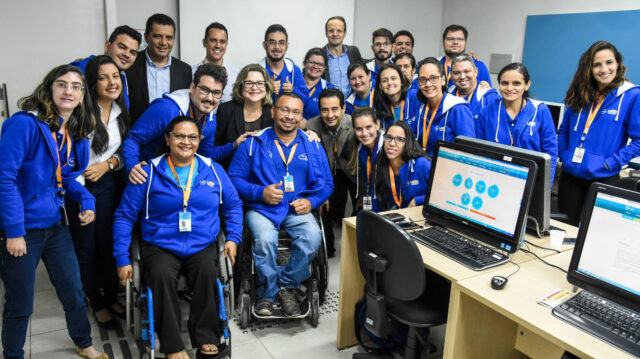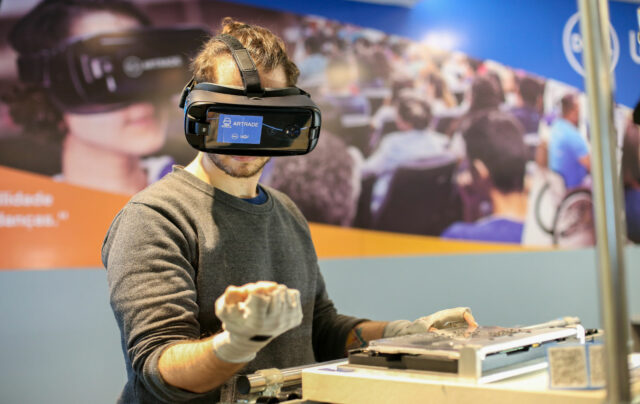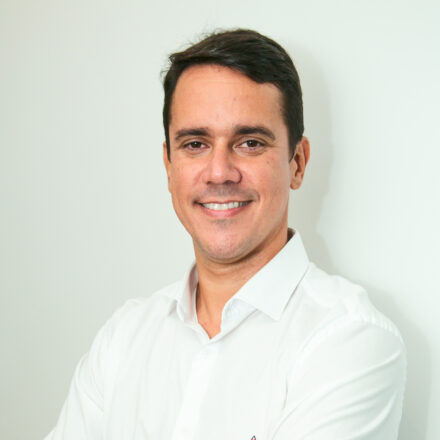Éder Soares’s love for technology was ignited when, as a child in the 1980s and 90s, he was drawn to video games and electronic toys. Thanks to that, today, Soares is at the forefront of an innovative research center in which technology plays a key role—to develop solutions for disabled people to gain work skills.
Twelve years ago, when Soares joined Dell, it was to work on an accessibility project. That project soon gave rise to LEAD, a Dell Research, Development, and Innovation Center, created in Fortaleza, Brazil. It was set up in 2011, in partnership with the State University of Ceará, with the primary purpose of solutions R&D in areas including natural language processing, wearable devices, artificial intelligence, web and mobile tools development, using current technologies in the market.
“LEAD develops products to meet local and global demands in various areas of knowledge, such as artificial intelligence, big data, machine learning, augmented reality, wearables, mobile solutions and others,” he says. “In addition, we are internationally recognized for our expertise in the field of assistive technologies. Over the years, we have developed several hardware and software solutions that have helped our company to include, integrate, develop, and retain people with disabilities in our teams.”
Under Soares’s leadership, LEAD has imparted free, accessible, quality training to more than 61,000 people; collaborated across Latin America, India, and the U.S.; developed assistive technologies and solutions; and picked up multiple awards and recognitions on the way.
Technology as an enabler

LEAD emerged when Dell Brazil sought to understand why companies had difficulty hiring people with disabilities, Soares says. They found that, in general, it had to do with a lack of accessibility to technology, a lack of proper qualifications, and the absence of opportunities. LEAD works to address these accessibility gaps through its education platform, technologies, and workspaces.
Soares believes that an important part of the solution to integrating disabled people into the workforce lies in technology. Most have a gap in their qualifications, affecting their employability and performance at the workplace, and the best way to mend this gap is by using technology. “We realized…we could do a lot for people with disabilities if we had the right technology.”
A Pew Research Center survey from 2021 points to a digital divide between adults with and without disabilities. Those with a disability are less likely to own a computer or smartphone or have broadband at home. Even though the Pew survey is of people living in the U.S., the problem is universal. In general, this divide happens because of inequitable access to technology, which is where LEAD comes in.
The first product that Soares’s team developed was a training program that provides free, accessible, and quality education. Today, the Dell Accessible Learning (Dal) platform has over 2,800 hours of accessible content with around 50 courses certified by the State University of Ceará. The classes are grouped under the categories of systems development, data science, informatics, languages, personal development and technical support.
The courses can be taken on mobile devices as well as desktops and have several accessibility tools, like adjustable font size, text descriptions, audio descriptions and sign language, and it responds to virtual keyboards and voice commands. Dal isn’t a platform just for disabled users, Soares points out—it’s for everyone; it’s inclusive, not exclusive. Other solutions developed by LEAD include:
• WAL, which helps blind and low-vision people, and deaf people to use web systems that are not accessible.
• STEVE, an exoskeleton that helps those with lower limb limitations to stand and work in factories.
• ARTRADE, an augmented reality platform to train deaf people in the assembly of laptops.
• MAIA, a tool that transforms sound waves into images for deaf people to test the speakers assembled in our factories.
• OPI, an application that helps children learn in a fun and dynamic way.
• Headmouse, a wearable device that gives virtual autonomy to people who are quadriplegic, enabling the control of actions only with the movement of the head.
In recent years, in partnership with state and municipal governments, Dell offered thousands of vacancies for free online training courses for people with disabilities and social vulnerability, which were enabled by LEAD. Dell’s factory in India also adopted a LEAD solution (Maia) to implement accessibility systems—a first outside Latin America.
“For me, the real impact is when we reach people, when we positively impact people’s lives. People in more than 10 countries have already benefited from our solutions, in Latin America, in India, in the United States.” – Éder Soares, leader of the Dell Research, Development and Innovation Center (LEAD) at Dell Technologies
Empowerment through innovation

LEAD has trained tens of thousands of people and developed several solutions targeted towards those with disabilities and those who are socially vulnerable. It’s a 150-strong team comprised of both Dell and third-party employees, including developers, testers, scientists, etc. “Our products are developed in partnership with the Ceará State University,” Soares says.
At the Innovation Center, they take care of the entire life cycle of their projects—from conceptualizing the scope of solutions to testing and deployment. “But for me,” Soares adds, “the main thing is because we have 40 employees with disabilities in the entire process…I would say that our solutions are developed by people with disabilities for people with disabilities.”
LEAD also has some awards to its name. In Fast Company’s 2020 World Changing Ideas Awards, it was an “Honorable Mention” in the best ideas in South America list. In 2022, it won the manufacturing award at Dell’s Global Olympics, the Innovation Olympics. But when asked about the impact of LEAD, there is something Soares rates higher than awards, the number of projects executed, or the patents filed: “For me, the real impact is when we reach people, when we positively impact people’s lives,” he says. “People in more than 10 countries have already benefited from our solutions, in Latin America, in India, in the United States.”
Soares believes that LEAD’s innovations will continue to develop more solutions for people with disabilities and find new ways to contribute to Dell continuing to be the inclusive company that it is. He advises young leaders looking to boost innovation and create impactful change to cultivate an organizational culture that values creativity and diversity of thought in experimentation.
“Encourage team members to embrace failure as part of the learning process,” he says, “and to think beyond conventional boundaries, to take calculated risks, and adapt quickly to changes. Additionally, maintain constant focus on your organization’s purpose and mission to ensure that innovation contributes to a sustainable, positive impact on the world.”
Innovators at Work is a series on Perspectives profiling Dell team members who drive innovation by combining ideas and technology to create life-shaping impact. The series is inspired by Dell’s Innovation Index, which provides insight on what global decision makers are doing to create innovation resilience in turbulent times.

